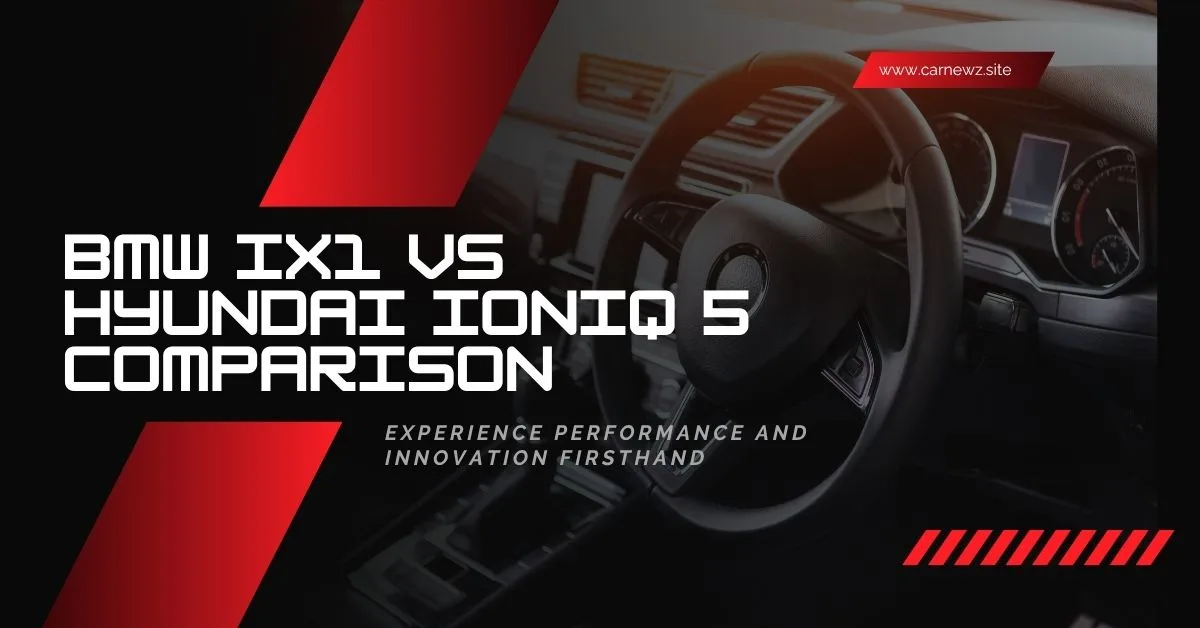Introduction
If you’re considering an electric SUV, the BMW iX1 and Hyundai Ioniq 5 are two fantastic options. Both models offer unique features and performance that cater to different preferences and needs. In this post, I’ll dive into a comprehensive comparison of the BMW iX1 vs Hyundai Ioniq 5, highlighting their strengths and weaknesses to help you make an informed decision.
Powertrain and Performance
Let’s start with what really matters: performance. The powertrain plays a crucial role in how these vehicles feel on the road.
| Feature | BMW iX1 | Hyundai Ioniq 5 |
|---|---|---|
| Variants | eDrive20, xDrive30 | RWD, AWD |
| Power Output | 201 hp (eDrive20), 309 hp (xDrive30) | 215 hp (RWD), 325 hp (AWD) |
| Torque | 247 Nm (eDrive20), 494 Nm (xDrive30) | 350 Nm (RWD), 605 Nm (AWD) |
| 0-100 km/h | 8.6 seconds (eDrive20), 5.6 seconds (xDrive30) | 7.6 seconds (RWD), 5.1 seconds (AWD) |
| Top Speed | 170 km/h (eDrive20), 180 km/h (xDrive30) | 185 km/h |
| Battery Capacity | 64.7 kWh | 72.6 kWh |
| Range | Approx. 440 km (WLTP) | Approx. 631 km (WLTP) |
| Charging Time | DC fast charging (10-80%): 29 mins | DC fast charging (10-80%): 18 mins |
From this table, it’s clear that the Hyundai Ioniq 5 edges out in both range and charging efficiency, making it a strong contender for long-distance driving.
Design and Interior
Next, let’s talk about design and comfort. The aesthetics and interior space can make a significant difference in your driving experience.
The BMW iX1 features:
- Dimensions: 4500 mm length, 1845 mm width, 1616 mm height
- Cargo Space: 490 liters
- Interior: High-quality materials with a luxury feel
The Hyundai Ioniq 5 offers:
- Dimensions: 4635 mm length, 1890 mm width, 1605 mm height
- Cargo Space: 527 liters
- Interior: Spacious with a minimalist design, dual 12.3-inch displays
In terms of space, the Ioniq 5 has a slight advantage, especially if you often carry passengers or luggage.
Features and Technology
Both vehicles are equipped with cutting-edge technology, but they cater to different preferences.
The BMW iX1 includes:
- DC fast charging support up to 130 kW
- Safety features like lane departure warning and multiple airbags
- Infotainment system with a touchscreen, wireless Android Auto, and Apple CarPlay
On the other hand, the Hyundai Ioniq 5 comes with:
- DC fast charging support up to 350 kW
- Advanced safety features including rear cross-traffic alert
- Dual 12.3-inch displays for a modern infotainment experience
With its superior charging capability and advanced tech, the Ioniq 5 may appeal to tech-savvy drivers.
Pricing and Value
Finally, we can’t ignore the price points of these vehicles, as they often influence purchasing decisions.
The starting prices for these SUVs are:
- BMW iX1: ₹66.9 Lakhs (ex-showroom)
- Hyundai Ioniq 5: ₹46.05 Lakhs (ex-showroom)
The BMW iX1 is positioned as a luxury vehicle, while the Ioniq 5 provides excellent value for its features and capabilities.
Final Thoughts
So, which one should you choose? If you’re after a premium driving experience with luxury touches, the BMW iX1 may be the right fit for you. However, if you prioritize advanced technology, spacious interiors, and better range, the Hyundai Ioniq 5 stands out as an exceptional choice. Ultimately, your decision will depend on your personal preferences and lifestyle needs.
I hope this comparison of the BMW iX1 vs Hyundai Ioniq 5 helps you make a more informed choice!




